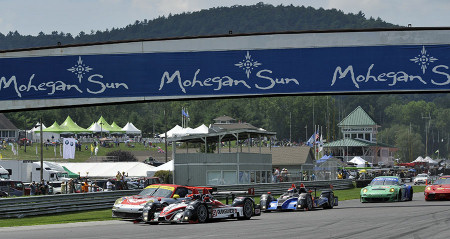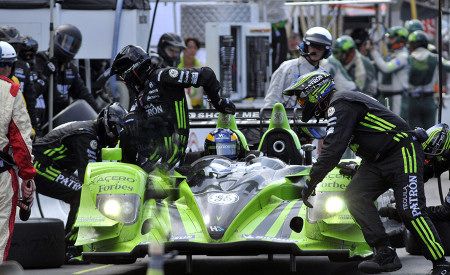The Way It Is/ The ALMS searches for a new direction
by Gordon Kirby It's always a pleasure to go to Lime Rock. For me, it's a green and pleasant drive, a little less than four hours from New Hampshire down through Vermont's Green Mountains and across the Berkshires in western Massachusetts before dropping down through Stockbridge and Great Barrington into Litchfield county in the northwest corner of Connecticut.
It's always a pleasure to go to Lime Rock. For me, it's a green and pleasant drive, a little less than four hours from New Hampshire down through Vermont's Green Mountains and across the Berkshires in western Massachusetts before dropping down through Stockbridge and Great Barrington into Litchfield county in the northwest corner of Connecticut.
Lime Rock has long been a bastion of road racing in the northeast drawing fans from across New England and New York. Despite hot and steamy weather last weekend's ALMS race at Lime Rock drew as strong a crowd as ever, filling the parking areas and sprawling over the track's grassy hills and knolls. It was great to see in a time when NASCAR and IndyCar are struggling with fading crowds and empty grandstands at most tracks.
The ALMS race at Lime Rock was won by veteran Greg Picket's Porsche RS Spyder co-driven by Klaus Graf who survived a fender-banging match with David Brabham. Graf was given a stop-and-go penalty but the incident left Brabham's Highcroft ARX-01b with a deflated tire. Brabham had to pit for fresh rubber, enabling Graf to win by 27 seconds. Chris Dyson led the opening laps in Dyson Racing's Lola-Mazda and Johnny Cocker also led for a while in Drayson Racing's Lola-Aston Martin but both were early retirements.
As everyone knows, the loss in recent years of factory or factory-backed P1 and P2 teams from Audi, Porsche and Acura has left the ALMS with a thin field of prototypes so that the ALMS is looking for the right way forward for the future. ALMS vice-president of technical operations Scot Elkins commented at Lime Rock on the state of the organization's debate.
"In principal everything that we do is the same as [Le Mans organizers] the ACO," Elkins observed. "In reality, our market and our race series are very different. So we're in the process of analyzing what our situation is based on the current cars we have and potential cars we're going to have, and we're going to try to see what approach to take.

© Gary Gold
"So unfortunately, we're in a little bit of flux," Elkins added. "We're trying to figure out what the right thing is for us. We're happy that they grandfathered the 2010 P1 cars for 2011. That was very important to us because all the P2 cars that we have--unless they decided to turn into P1s next year--they wouldn't run. So were trying to figure out where all this goes."
Rob Dyson is a longtime supporter of American sports car racing. Dyson's Lola-Mazda is running this year on isobutanol, a biofuel developed by BP, no less, but it's an example of Dyson's commitment to developing new technology.
"What I like about the ALMS is the variety of different automobiles and the variety of different types of engines and powerplants you can bring," Dyson remarked. "There's just a little more science and hot-rodding you can do in the ALMS. That's what makes it so much fun. We've made a lot of changes in our cars and fortunately the rules allow us to do all the things we do. We run against a couple of normally-aspirated V8s and we're going to be running against diesel cars at Petit Le Mans. I think the variety is interesting and I believe the ALMS has the fan base because the cars are so interesting. You come to see different cars and engines race. That's what it's all about."
Dyson agrees with Elkins that the ALMS needs to find a way to encourage more independent teams to race prototypes.
"Rule stability is important," Dyson commented. "I think one of the things is that the ACO has to understand that for many years teams and cars came and raced at Le Mans and won at Le Mans, but they raced nowhere else. Some of them showed up, raced at Le Mans, won, and were never see again. The rules for that race created lab specimens that ran only once and then were put on the shelf. Big factories would come in with huge budgets and terrific, awesome cars. Some of them were the most incredible race cars ever built, but they would race once and then they'd disappear.
"But it's different if you're trying to create a rules package that is going to be run worldwide and run over several countries in North America. I think the ACO has the fiduciary responsibility to assume that we've got a series to run and everybody isn't a factory. Everybody cannot update and change their cars year in and year out with wings or bodywork or whole engine packages.

© Gary Gold
Dyson thinks the ACO is beginning to realize it must adopt more of the ALMS's thinking.
"I think they're starting to learn and are mouthing those things," he observed. "But I think they've got to start believing it and understanding it. That's my biggest fear with those guys. They have to understand the economics of rule changes. What is it going to do to the show and is it going to make the cars any more safe?
"They've got to understand that they've got to have enough cars to put on a show. That has to be the prism by which they look at every rule change. For five years they've had the diesel and gasoline cars and they haven't yet figured out how to do an equalization. You get more fuel economy with a diesel car so in my opinion they should cut their capacity so that they've really got to race those diesel cars between pitstops. To me, that's a simple and cheap way to do it. Any race team can afford $1,500 for the filler and the fuel cells. It's simple. That's what I think they've got to do."
Scot Elkins says the ALMS believes it must cater to independent teams and 'gentlemen drivers' and Elkins agrees with Dyson that the ACO is beginning to think more like the ALMS.
"It's not a secret that sports car racing is about what we call the 'gentleman driver'," Elkins commented. "Those are the guys that truly keep it going. It may sound strange but the way we run this business is that the guys who race in our series are our customers. We have to take care of them in that sense and the 'gentleman driver' is our best customer. So we've always got to keep them in mind. That's why we have differences so often with the ACO because we don't have the Le Mans 24 Hour race.
"They're always going to have fifty-five cars at Le Mans and they're always going to have a number of major manufacturers competing in that race. But outside of Le Mans that's never true and now the LMS series in Europe is starting to feel our pain. And the great part about that is the ACO is starting to listen to us and ask us questions and take our feedback, which is fantastic."
Lola Cars American manager Steve Charsley agrees with Elkins and the ALMS's approach.
"The series is looking at this more as a gentleman driver-based, semi-pro championship," Charsley said. "It takes an awful lot of money to develop a racing engine and the manufacturers are moving toward production-based engines. The ALMS want to use production-based engines to make an affordable series and P1 will become more production-based as time goes on and it's melded together with P2. For the longterm I think it's very good."

© Gary Gold
"I think it will be very much like the GT cars where a number of OEM's are supporting teams to a degree," Charsley said. "I think the P2-type cars will attract similar support and the engine base is pretty much the same so an OEM can support a product in GT and LMP2 with the same base."
It's essential Charlsey says to get everyone singing from the same songsheet as well as being prepared to adapt if required.
"Everybody needs to be on the same page saying where do we need to get to and how do we get there," he stressed. "It's not going to happen in one decision and one meeting It's going to happen by cultivating the series where it needs to go. Next year is a bridge year and they might find they have to take a step sideways or backwards."
Two weeks ago Lola unveiled its new P2 car and a wider range of more economical Lola prototypes will be revealed in the coming weeks.
"We've come up with a price cap car," Charsley noted. "The price is 340,000 Euros and it's a full-fledged Lola with quick change rear end and a full carbon tub and body. Every component is very similar to what we have on the current P1 and P2 cars. I believe our customers will get good value because they're buying a well-sorted and evolved race car that is straightforward and simple to run with an awful lot of knowledge and support through the years. All our parts will be interchangeable between all of our cars."
Duncan Dayton's Highcroft team hopes to retain its ALMS title this year but is facing serious competition from Picket's Lime Rock-winning Cytosports Porsche and Dyson's Lola-Mazda. Dayton echoes Rob Dyson's enthusiasm for the ALMS.
"There's great competition in the ALMS down through all four classes," Dayton said. "If you want to see a really exciting motor race as opposed to some of the processions that we see in other series you've got to come watch an ALMS race."
Dayton hopes to expand Highcroft to a two-car team.
"We're looking at continuing on in whatever the LMP1 configuration is here in the ALMS," he said. "We're definitely interested in being a factory LMP1 two-car program and we're working on several different options for next year at the moment. We're cautiously optimistic that we'll find the appropriate program."

© Gary Gold
"In my mind there's no experience like going to Le Mans," Dayton remarked. "Our crew chief Rob Hill has done it all in Indy cars. He won the Indy 500 and the championship with Ganassi and he walked out on the starting grid at Le Mans and said, 'I haven't had the hair stand up on the back of my neck like this since the heydays of CART.'
"Le Mans is unlike anything you can imagine. The scope and scale and size of it is so epic and it would be great to have that kind of passion and enthusiasm for racing in America. To me, what makes that passion burn so brightly is that Le Mans is absolutely open competition. There's everything from the Peugeots and Audis going at it hammer and tongs and the P2 and GT2 classes are much stronger now. The competition is phenomenal."
Dayton is anxious to see the ALMS take a more business-like approach.
"How do we fix motor racing in America?" Duncan ruminated. "There's so much opportunity in the ALMS and in my mind there's very little business acumen applied to the problems at hand. If you were a luxury brand--a watch or a handbag or a pair of jeans, whatever it is--how do you differentiate yourself from your competitors to gain an allegiance and following that you need to be successful? It's a relatively basic equation if you boil it down to the elements of how to run a business.
"I think a lot of times we forget that this is a business and I would advocate a much more fully-developed business model that's sustainable over multiple years. For the teams to have to survive year-to-year on sponsorship, or whatever partnerships you can establish, is really difficult. Highcroft is blessed with wonderful opportunities, but it's stll a challenge to make sure that your programs are solid and in place for years to come.
"When I first went to Scott Atherton in 2005," Dayton added, "I took a five-year business plan to him and he laughed. He said I was the first team owner who had ever brought him a business plan. I'm pleased to say that we hit every milestone that we set for ourselves in that business plan. Unless you have a road map of where you're going, how the heck are you going to know when you get there?"
So goes the ALMS's debate within its ranks and with the ACO. From Lime Rock to Laguna Seca, America's road racing fans hope they find the right solutions.
Auto Racing ~ Gordon Kirby
Copyright 2010 ~ All Rights Reserved
Copyright 2010 ~ All Rights Reserved
Top of Page